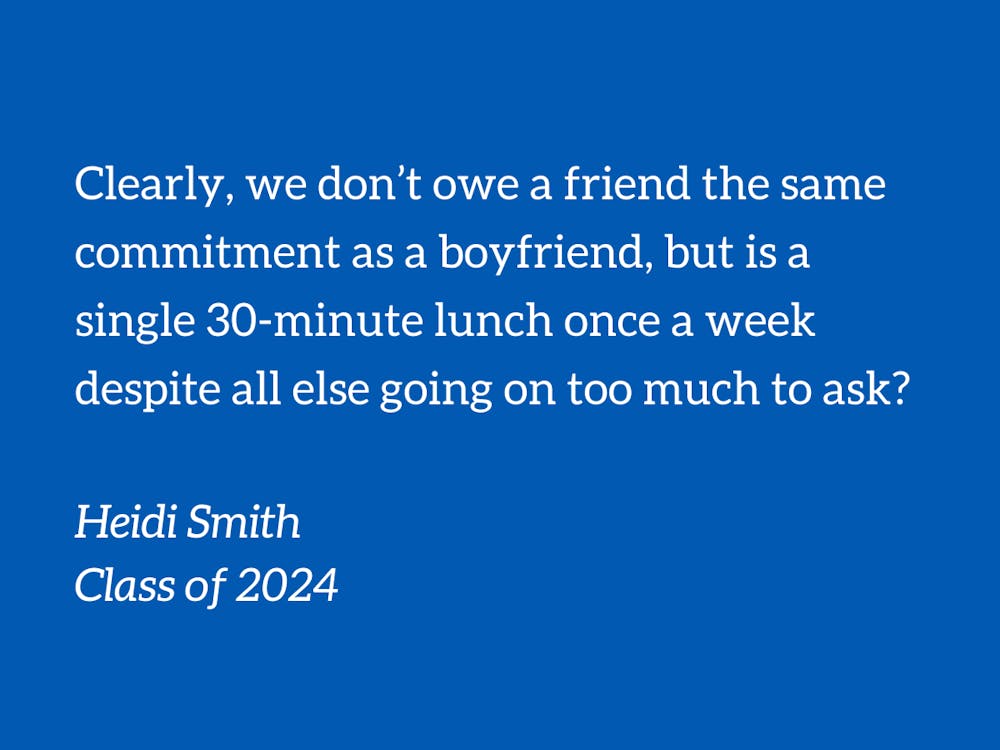Picture this: it’s 75 degrees and sunny on a Friday afternoon near the beginning or end of the school year. Clubs are tabling on BC Plaza; friend groups are sprawled out on the steps; some organization is passing out Locopops. Every grassy surface in sight is covered in picnic blankets, and several groups of guys have set up spikeball on the main quad.
Now think about a gray-skies, cool day in the middle of the semester. Even if it’s not raining, we don’t tend to spend a lot of time outside when the weather is dreary. On one such less-than-rosy day a few weeks ago, a friend from UNC was visiting. I remarked that it was a good thing he didn’t come on a sunnier day because, otherwise, he might have to change his negative opinion of our school.
Just like the fact that the weather plays a strong role in the general vibes of campus on any given day, many students here are what I would call, perhaps anachonistically, fair-weather friends. By fair-weather friend, I don’t mean someone who taunts you for living in a milder climate, as one Urban Dictionary poster writes—though, have you met anyone here from California? The OED’s definition is more what I’m referring to: someone who is a good friend when it is easy to be so. Durham’s recent predictability unpredictable weather has got me thinking about how our friendships withstand various changes in life conditions.
Maybe I’ve gotten one too many “hey, how are you, Heidi…can you do me this favor” texts from a friend I haven’t seen in weeks. Or, maybe I’ve somehow become an extrovert since coming to college and would much rather eat with someone than take to-go dinner in my dorm room. But I don’t really understand the whole “I’ve got a midterm, paper, problem set, etc. this week, so I can’t get dinner” thing a lot of people do. Personally, I also find that people are more willing to hang out when the weather is nice, too, no matter that indoor activities can be done regardless of whether it’s sunny.
It’s kind of funny, because if we were treated by a romantic partner the way many people approach friendships here, those same friends would tell us to leave that relationship—heck, I’ve told people to consider leaving relationships for this reason. It’s the bare minimum that your boyfriend or girlfriend makes time for you. But it seems that this same stuff is completely permissible with platonic connections. Clearly, we don’t owe a friend the same commitment as a boyfriend, but is a single 30-minute lunch once a week despite all else going on too much to ask?
As a general student body, we’ve established that going to class and all that goes along with the academic parts of our education are not the most important things we do here. The next logical conclusion as to what reigns supreme would be the connections we make—that is, our friends. But I don’t think I’m convinced that this is true either. If I really think about it, the one thing that seems to never fall by the wayside when things get hard is—big surprise—our professional goals.
Since we go to such a well-connected and resourced school, we’re encouraged to leverage these opportunities as best we can to advance ourselves as pre-professionals in our fields of choice. We’re encouraged to see these types of relationships as transactional—if someone scratches our back now, we’ll do the same in the future or pass it along to someone like us when we’re the ones with the power. Whether or not this is ethical is another matter altogether, but I’m more concerned that this seems to have seeped over into the personal.
One of the most challenging parts of social life they don’t tell you about going into college is that friendships are often episodic. You’re really close to someone for a short period and then, for whatever reason, get lunch once a semester for the rest of college. We have friends of convenience, maybe for a semester when taking a class together or while in the same city for a summer, and you don’t always know if they’re gonna last. Other times, it’s like a sitcom—the supporting characters are only in the episode if they’re free that week. How you stand with that person doesn’t have anything to do with your own actions, but rather how good that friend is at time management versus the amount they have right then.
The gardens are still lovely to walk in when it’s cloudy—maybe not during a flood warning, but how often do those happen? The sunny days won’t be made less rosy by choosing to enjoy the dreary ones. It’s nice to take a 45-minute break from an essay to see a friend, and, I’ll argue, it makes it easier to write a good essay when you give yourself breaks and structure your time to fulfill other needs.
College is probably the last chance to live nearby to so many close friends in our whole lives. Squandering these four years working ourselves in circles while sacrificing the parts that are so special is silly. Consistency despite external factors is a virtue to which we should give more weight. When even how sunny it is determines how willing we are to spend time with friends; that says a lot about what we perceive to owe each other, and not at all in a good way.
Heidi Smith is a Trinity junior. Her column runs on alternate Mondays.
Get The Chronicle straight to your inbox
Signup for our weekly newsletter. Cancel at any time.

